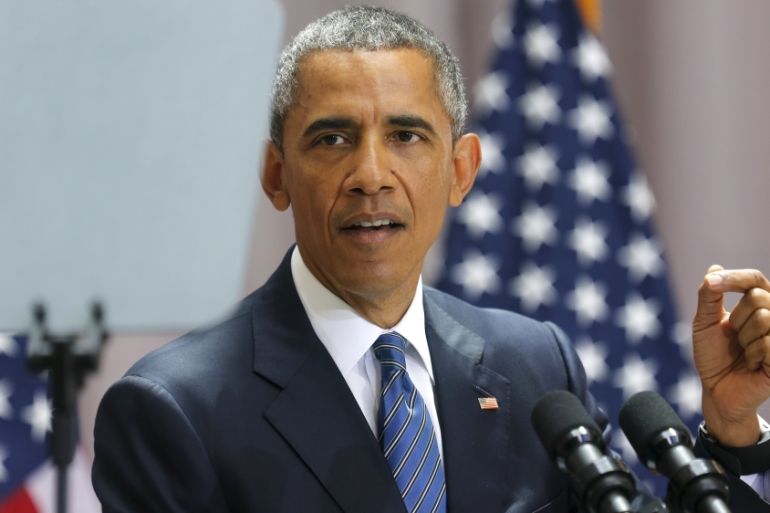Obama: Abandoning Iran nuclear deal could mean war
US president defends historic nuclear agreement after Israel attempts to mobilise the US Congress to thwart it.

US President Barack Obama has defended the international nuclear agreement with Iran and warned the US Congress that blocking the pact could spark a war in the Middle East.
Obama’s speech at a Washington DC university came after Israeli Prime Minister Benjamin Netanyahu launched a campaign on Wednesday to mobilise Jewish Americans to urge the Republican-led Congress to thwart the historic agreement.
“It is a very good deal,” Obama said.
|
|
“Every nation in the world that has commented publicly with the exception of the Israeli government has expressed support,” Obama said.
“I recognise [Israeli] Prime Minister Netanyahu disagrees, disagrees strongly – I do not doubt his sincerity – but I believe he is wrong.”
Under the agreement reached between Iran and a group of six world powers known as the P5+1, the countries agreed to lift economic sanctions against Iran in return for curbs on its nuclear programme.
Obama warned that abandoning the July 14 pact could accelerate Tehran’s path to a bomb and the US’ credibility around the world would be seriously damaged if it refused to abide by the terms of the deal in lifting sanctions against Iran.
Analysis: What does the Iran nuclear deal mean?
He said the alternatives to military action “will have been exhausted once we reject a hard-won diplomatic solution that the world almost unanimously supports”.
In what Obama described as “the most consequential foreign policy debate that our country has had since Iraq”, the president also compared those who were against the deal to supporters of the decision to invade Iraq.
“Many of the same people who argued for the war in Iraq are now making the case against the Iran nuclear deal.”
Obama also highlighted that Iran’s defence budget was eight times smaller than that of the US’ Gulf allies.
|
|
Economic consequences
Al Jazeera’s Patty Culhane, reporting from Washington, said Obama also made a new argument – an economic one – warning that the US would be the only country isolated if it refused to comply with the international agreement.
“We’d have to cut off countries like China from the American financial system and since they happen to be major purchasers of our debt, such an action could trigger severe disruptions to our own economy and raise questions about the dollar as reserve currency,” Obama said.
Opinion: The three myths: How the Iran deal impacts the Middle East
Our correspondent said that the Obama administration was so concerned about the vote that it dispatched the head of the world’s nuclear governing body, the IAEA, to brief senators behind closed doors.
In a webcast organised by Jewish groups in North America, Netanyahu on Wednesday reiterated Israel’s arguments that the July 14 deal was not enough to curb Iranian nuclear projects with bomb-making potential.
He argued that a windfall in sanctions relief could help Tehran finance destabilising regional conflicts.
“I don’t oppose this deal because I want war. I oppose this deal because I want to prevent war. And this deal will bring war,” he said.
![Israeli Prime Minister Benjamin Netanyahu is urging Jewish Americans to pressure the US Congress to block the deal [AP]](/wp-content/uploads/2015/08/556dfe72a22b4b30a609fa97a4ef6dea_18.jpeg)